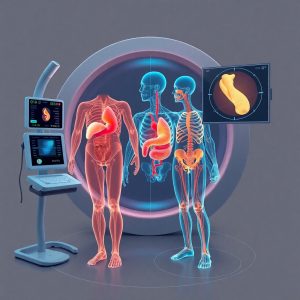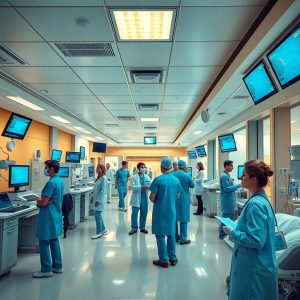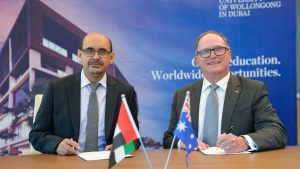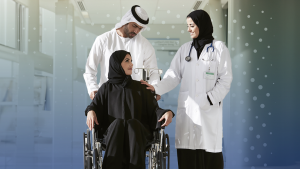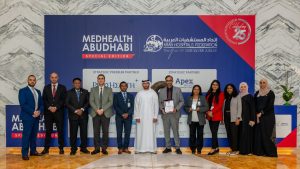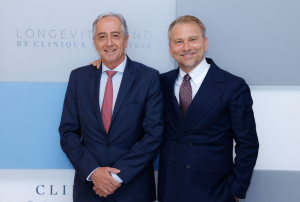Imagine a future where cutting-edge technology seamlessly integrates with world-class healthcare services to deliver personalized, precise and preventative care.
This future is not far off; it is being shaped today by M42; an innovative healthcare powerhouse based in Abu Dhabi.
Born from the strategic alliance of G42 Healthcare’s advanced medical technologies and Mubadala Health’s premier patient services, M42 is set to revolutionize the healthcare landscape.
By harnessing the power of data-centric solutions and state-of-the-art facilities, M42 aims to bridge the gap between groundbreaking healthtech advancements and tangible clinical outcomes.
Recently, Mediworldme have the opportunity to speak with Mr. Albert Connie, the Senior Vice President of M42 and an active participant in the Abu Dhabi Biobank.
With a pivotal role at the intersection of healthcare innovation and biobanking, Mr. Connie brings invaluable insights into how M42 is advancing personalized and preventative care through cutting-edge technology and data-driven solutions.
Let’s delve into his experiences and the transformative work happening at M42.
Could you start by giving us a brief introduction about yourself? Also, could you explain what the Abu Dhabi Biobank is all about?
My name is Alvarado, and I am the Senior Vice President at M42. M42 represents the joining of two industry titans: Mubadala Health, with its renowned assets like Cleveland Clinic Abu Dhabi and the Imperial College London Diabetes Center, and G42 Healthcare. Our goal is to bring technological innovations directly to patient care. One of the major enablers of this mission is the Abu Dhabi Biobank.
How does the Abu Dhabi Biobank help M42 achieve its goals in drug discovery, oncology, specialized therapeutics, and precision medicine?
We aim to represent our communities in the region through advancements in drug discovery, oncology, specialized therapeutics, and precision medicine. To achieve this, we need a sustainable biobank to collect biosamples and conduct research that leads to new therapeutic solutions.
How do you compare Abu Dhabi Biobank with other leading Biobanks globally?
We are fortunate that the Abu Dhabi Biobank consolidates the entire ecosystem under one roof. It integrates all data generated across the ecosystem, including genomic data and clinical datasets, and links it to the biorepository of the samples themselves. Unlike most biobanks that operate within specific cohorts or disease groups, Abu Dhabi Biobank offers a comprehensive and unified approach.
How does being integrated within the entire healthcare ecosystem and having the support of a proactive regulator, like the Department of Health, contribute to the success of your initiatives?
We are fortunate to be integrated within the entire healthcare ecosystem, supported by a proactive regulator. The Department of Health is establishing a framework that ensures the success of our initiatives.
What international standards does the Abu Dhabi Biobank adhere to regarding sample collection, storage, and data management?
When it comes to international standards, Abu Dhabi Biobank adheres to both AABB and ISO standards. However, what’s paramount is the sovereignty and meticulous management of data sets. We take this responsibility very seriously. Additionally, we are privileged to oversee the Emirati Genome Program, a significant initiative involving the sequencing of one million whole genomes.
How does M42 ensure data security and compliance with international standards while managing the Emirati Genome Program and other initiatives involving sensitive data?
Ensuring data security is paramount for our program. We have extensive experience in data management and adhere rigorously to international standards. This ensures that data can be utilized both proactively and safely.
How is M42 collaborating with leading biobanks, and what successful partnerships or joint research projects are you currently advancing?
One of our key innovation drivers is the development of an Innovation Hub. This hub allows collaborators, including those in wet lab and research, to physically join us at the Abu Dhabi Biobank. They work directly with specimens to drive innovation within the UAE and the broader region. By opening our doors to international collaboration, we aim to catalyze advancements in healthcare and research.
How does Abu Dhabi Biobank ensure the security and privacy of biological samples and associated data? How do your data protection measures compare with those of the leading global biobanks?
Equally important is obtaining informed consent from participants donating their samples. This consent allows us to work with the samples and entails informing donors about the specific nature of the research and activities we undertake.
Based on the fundamental principle of informed consent, we adhere rigorously to local regulations and international standards. This ensures that we can collaborate effectively with international pharmaceutical companies and global partners.
Maintaining these high standards is crucial as we inform our participants about how their data will be used to enhance lives and potentially bring new therapies to our community.
How does M42 plan to raise public awareness and encourage local community participation in biobanking, especially considering it is a relatively new concept in the Middle East?
We have always built upon our past successes, such as the Emirati Genome Program. In my view, the program’s success stemmed from our robust community outreach and awareness efforts. Achieving a 65% sequencing rate of the entire population in just three years required more than infrastructure and scientific capability; it demanded deep integration and engagement with the community.
We conducted multiple awareness campaigns and established a physical presence in all government healthcare providers. Additionally, with strong support from regulators, we enhanced community awareness effectively.
What is your strategic plan for the future development of the Biobank?
Our primary objective is to establish the necessary infrastructure, capabilities, and regulatory framework for safe operation within our domain. Initially, our focus will be on cord blood banking services, collecting stem cells from expecting mothers and newborns to create a cord blood bank. This will support clinical therapeutics approved by local regulators.
Secondly, we will concentrate on disease-focused collections, with cancer as a primary focus for the human-side Biobank.


